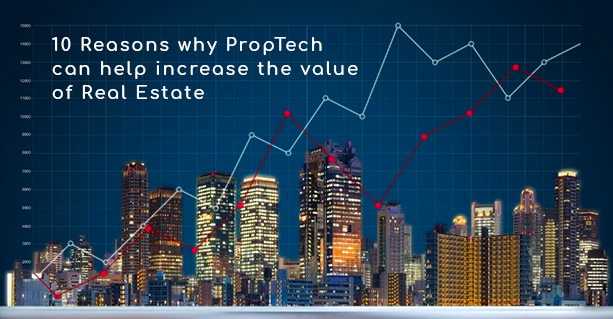The real estate and construction industry is undergoing a large digital transformation that is changing the nature of the market, the office and work environment, as well as influencing the growth of real estate. Also, the demand of technology-enabled innovations, new soft skills, and developing EU legislations are driving companies to invest in and adopt proptech solutions. Such innovations would allow company processes, products, and employees to be integrated into a network for data collection & analysis, process efficiency, corporate improvements as well as benefiting the end-user experience.
In an event held by PropTech Lab, Benoit Dubrulle, CTO at Vicinity said “Because there are a lot of data and information about the tenant, there are several benefits in innovation, transparency, promotion, occupancy, better communication, and higher value. This will allow tenants to stay for a longer term, which results in a long-term ROI.“
PropTech can also be seen as the leading catalyst to the transformation of business cultures and activities. For instance, solutions such as indoor mapping, property and facility management, IoT at work and home, automating leasing, data and valuation analytics, real-time data, BIM technologies and smart buildings can ease the digital transformation of the sector, build an eco-system approach to effectively and efficiently manage information, optimize processes for quality and agility.
We also see new trends in the market. Companies are moving away from traditional office space and into a more disintegrated common spaces. Carlo Van Der Steen, SVP Direct Sales at SPACEWELL | A Nemetschek Company says “Proptech is fundamental to beat challenges such as how much office space do we need? How to support the employee experience in this change? How to ensure a safe & healthy return to the office? and finally, how will it make us contribute to be climate-neutral by 2050. Therefore, the technology, data, and analytics generated from the building can help answer these questions and help support the flexibility of office spaces and agile spaces because talent is everywhere, the cost of saving on unused space and energy fees is important and employees are more productive as they feel empowered.”
More so, Khadija Nadi, CEO at DeltaQ also said “If we look at asset managers and owners, PropTech can add value to the compliance of the legislation that we see today. PropTech can definitely help because it is not intrusive. With PropTech, the majority of the solutions are tech-enabled. In other words, the owner can begin with one building and can later extend to several other buildings, without bothering the tenants.”
With that in mind, ING published an article journal that highlights the opportunities of proptech applications in real estate, including the “space as a Service, Sales platforms, blockchain & tokenization, administrative management services, as well as the advantages of smart buildings. One of the key benefits of such proptech applications is the potential digital customer journey, displayed below.
ING: Technology in the real estate sector PropTech reduces risks and increases value
It is obvious that even today the real estate sector has a long way to go to become fully digitized. However, noteworthy steps are being made. In the coming years, in order to push for a fully digitalized customer journey, webshops, just like e-commerce, can customize the whole process in the real estate trade. IoT, data and algorithms can help new tenants view, select and sign contracts virtually and digitally. Furthermore, in the end, smart buildings can provide tenant feedback about their current energy spending, and use of the property, in order to have a more accurate maintenance report and reduce costs.
Properly explained by Grégoire De Donnea, the CEO at Smovin, “The right tool should allow you to automate all the non-added value tasks and help an individual avoid losing money. Therefore, digitization and automation are important tools to help landlords and property owners improve the profitability of their assets by avoiding management costs and giving them strong visibility of the performance of the assets.“
While the global COVID-19 pandemic has accelerated the use of innovative tools, it also helped to increase the value of the real estate. The ING study shows that proptech helps in increasing the liquidity of the real estate market by lowering the search and transaction costs. More so, proptech also lowers the required rate of return on investments in the market. This increases transparency, which in return reduces the risk of inaccurate asset estimation. Also, by adopting proptech solutions such as smart building sensors, occupants can achieve their ESG goals and benefit from higher-quality buildings and low energy consumption. This is viewed as an added value by the tenant and is justified in the form of higher rental prices.
This study study also shows 6 reasons how proptech can help lower the yield requirement and justify higher rental prices. For instance, on the investor side, (1) Big data and data analytics make real estate more transparent and valuations easier, (2) [online] platforms reduce search costs, digitization reduces transaction costs, which in return increases the supply and demand for real estate, (3) high quality buildings increase the chance of leasing more spaces and lower risk of vacant spaces. Also true, on the other side, tenants are asking for fewer spaces, higher quality, and lower energy consumption. In other words, (1) having better building insights helps in efficient leasing processes, and fewer m2s are required by the tenants, (2) extra services in the building provide added value, for which the tenant is prepared to pay more, (3) lower energy consumption reduces the total accommodation costs.
ING: Consequences of more PropTech in real estate on leasing, yields and value
Finally, whilst it is clear that proptech has advanced the adoption of technologies and increased the value of the real estate, it has also placed the traditional real estate in a disadvantage. Tenants are now-a-days more interested in high quality smart building, lower energy consumption rates and efficient occupancy processes.

Project Manager

